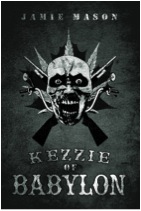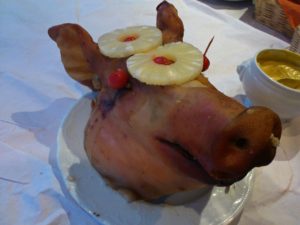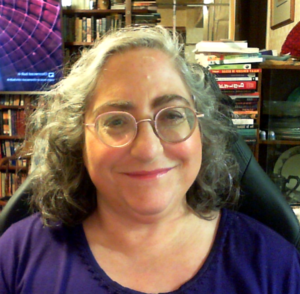Is Canada’s fascination with zombies the death knell of undead chic?
Good day, eh? And greetings from the Great White North. It’s great to be here on Cat Rambo’s blog to extoll the virtues of our great Canadian literary culture.
OUR GREAT LITERARY CULTURE

We’ve got some great writers up here in Canada, eh? Like, you guys probably think that Ernest Hemingway’s the best thing since sliced bacon. But a lot of people don’t know that old Ernie had the stuffing beat out of him by Canadian writer Morley Callaghan in a boxing match in Paris back in the 1920s. (So much for your Nobel prize there eh, Ernie?)
Speaking of Nobel prizes, I should mention Margaret Atwood. Now, Margaret’s a real good gal, eh? She can hold her beer and paddle a canoe with the best of us but she’s a pretty good writer, too. People say she should win a Nobel, but she’s been standing in line for so long now that they’ve lost interest in her (like we have with Prince Charles). But it doesn’t change the fact that she’s smart as a whip. About our great Canadian literary culture, she said:
“Canadians are forever taking the national pulse like doctors at a sickbed: the aim is not to see whether the patient will live well but simply whether he will live at all “¦ Our stories are likely to be tales not of those who made it but of those who made it back, from the awful experience — the North, the snowstorm, the sinking ship — that killed everyone else.” ““ SURVIVAL: A THEMATIC GUIDE TO CANADIAN LITERATURE, Chapter 1
Like I said, she’s clever. And she’s right! Even if she couldn’t have licked Ernest Hemingway in a boxing match in his prime (but I bet she could now, eh?)
What Canadians are most often challenged to survive is our great Canadian wilderness.
OUR GREAT WILDERNESS

Whenever Americans want to make a cowboy movie, they come north to film it, eh? Because all their wilderness is gone. We still have some of ours, although Prime Minister Harper is working hard every day to change that, and to make us more modern and civilized like America. Indoor plumbing, Velcro®, remote control tee-vees. What’s next?
Well, what’s next is the very popular Northern Gateway/Keystone XL Pipeline, eh? Because whenever Canadians want to make money, they go south because all our money up here is gone. But Americans still have most of theirs (although their politicians are working hard every day to change that, and to make them more modern and civilized like, say, Russia ““ or maybe the Chinese).
Anyway, with the wilderness gone, what is there left to survive?
Zombies of course!
OUR GREAT ZOMBIES

Hold your horses, eh? That’s no zombie, that’s Prime Minister Harper (although it’s kind of hard to tell the difference sometimes because he never blinks). Anyway, Prime Minister Harper occasionally takes breaks from rehearsing with his rock band the Van Cats to negotiate trade deals, like the one with China that introduces a mysterious street drug into Canada called L that unleashes a zombie apocalypse.
You probably never wondered what a zombie apocalypse would look like up here, but I tell ya’ ““ it’s pretty scary! I wrote a book about it, eh?

Now why would anyone write a zombie book that takes place in Canada? Well first off, there’s what Margaret said about how we’re always taking the pulse of the patient to see if he’s alive. That sounds right up Zombie Alley, if you ask me! And as for survival, well isn’t that the whole point of a zombie story?
Some of you might be asking: without any wilderness left to challenge your survival, how can this novel truly be Canadian?
Well, like I said, Americans travel north for our wilderness (what’s left of it) and we go south for money. But in abandoning nature for civilization, we’ve created a new wilderness ““ one inside ourselves that’s every bit as ugly and toxic as the slag heaps at Fort Mac, one we try and fill with cash and dope and a new flat-screen tee-vee or fishing boat or something like that.
But that’s just us, eh? Dead inside and following the herd, slack-jawed and trying to consume enough to fill that bottomless hunger the wilderness left behind when it vanished.
So thanks for reading. I hope you’ll check out my book, eh? I worked real hard on it.
““ la fin ““
(“˜cuz this was made in Canada, part of it has to be in French, eh?)
Bio: Jamie Mason is a Canadian sci-fi/fantasy writer whose short fiction has appeared in On Spec, Abyss & Apex and the Canadian Science Fiction Review. His second novel KEZZIE OF BABYLON was released by Permuted Press in March, 2015. Learn more at www.jamiescribbles.com
Want to write your own guest post? Here’s the guidelines.
#sfwapro
Enjoy this writing advice and want more content like it? Check out the classes Cat gives via the Rambo Academy for Wayward Writers, which offers both on-demand and live online writing classes for fantasy and science fiction writers from Cat and other authors, including Ann Leckie, Seanan McGuire, Fran Wilde and other talents! All classes include three free slots.





 Look, I love to write about terrible food. Life contains so much more of it than good food, or at least my life does. (I have limited funds and poor judgement for risk.) But more than the realism, I’m drawn to bad food because it infuses a scene with context, with a messy pathos. Someone failed before this dish was even served.
Look, I love to write about terrible food. Life contains so much more of it than good food, or at least my life does. (I have limited funds and poor judgement for risk.) But more than the realism, I’m drawn to bad food because it infuses a scene with context, with a messy pathos. Someone failed before this dish was even served.  Bio: Rachel Fellman is an archivist in Northern California. She writes sharp, painterly science fiction and fantasy about her various preoccupations: art history, extreme survival, toxic love, queer identity, and terrible moral choices. Most of her protagonists are great at exactly one thing and are continually prevented from doing it. Publishers Weekly called her debut novel,
Bio: Rachel Fellman is an archivist in Northern California. She writes sharp, painterly science fiction and fantasy about her various preoccupations: art history, extreme survival, toxic love, queer identity, and terrible moral choices. Most of her protagonists are great at exactly one thing and are continually prevented from doing it. Publishers Weekly called her debut novel, 




4 Responses
ZOMBIEDÄMMERUNG: In which I extend the frontiers of our Great Canadian Literary culture to @CatRambo’s blog, eh? http://t.co/8QBGtb6JvS
Cat Rambo: Guest Post from Jamie Mason: ZOMBIEDÄMMERUNG ““ Twilight of the Walkers http://t.co/6qbJZbFEMg
RT @Jamiescribbles: ZOMBIEDÄMMERUNG: In which I extend the frontiers of our Great Canadian Literary culture to @CatRambo’s blog, eh? http:/”¦
@detoxqueen @CatRambo